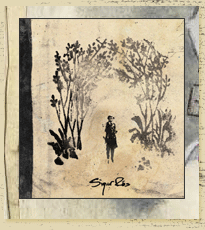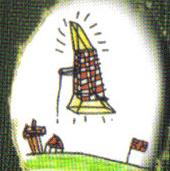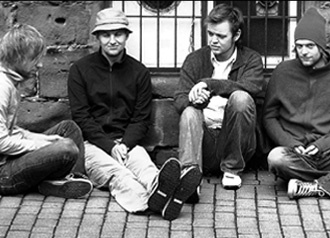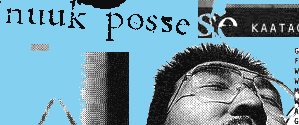| |||||||||||||||||
"He riffs on being a married man, with kids, in his 30s, telling family anecdotes. 'We're not selling out, we're just older, happier. Just as honest about our happiness now as our unhappiness then. The Heima tour also changed things - we had to play sometimes without electricity, and that was very exciting: it changed structures, it made songs shorter because the mood changes without reverb..."
"We rented a house in the Icelandic countryside to compose it in isolation, and then we had two weeks to record it in New York: a huge city so full of people and life. This album is definitely fun." The fun is infectious and should carry the quartet's music into the mainstream at last. There's one song in English, but the rest are in Icelandic. They like the fact that most of the world doesn't understand the language. Birgisson uses his voice as an instrument, striving to make sounds that are universal. One song, called Gobbledigook, is all about the tricks the wind plays."
Bernard Zuel at the Sydney Morning Herald writes: "What Sigur Ros have at their best is an emotional wellspring, a genuine sense of an interior journey within the songs, matched by the ability to arouse a similar response in the listener." Sigur Rós also seem to possess this Shamanic power, and all you have to do is listen to their music, to be taken into your Underworld, and be transformed. In this so-called "dark age" of gloom and terrorism and capitalist breakdown, most of it created by the media to keep us living in fear, it is so refreshing to have a band like Sigur Rós. They remind us that contrary to appearances, Good always triumphes over Evil. They remind us that there is an angel inside everyone of us.
Sigur Ros let loose -- on MTV. I never thought it was possible to convey that much emotion through music alone. From the opening seconds of the album, it sounds and feels like a sun or star starting to form in front of you -- and the star starts to send out fluctuating waves of sound which just melt you, instantaneously. From that moment, you are hooked, and the music won't let you go -- or do anything other than give it complete attention, for the full hour and 20 minutes or whatever it is until the end of the CD. I couldn't even get out of my seat, because I was floored by the power and intensity of the songs which followed.
If you are familiar with the work of Sigur Ros, you will recognise the many tendencies at work on med sud i eyrum vid spilum endalaust. If you are versed in the flamboyant post punk craziness of the Reykjavik music scene, you will hear again and again echoes of the Reykjavik sound, on this album. This is very much a Reykjavik album, not that there are many foreigners versed enough and sensitive enough, to appreciate it. Hang out for a while on the Bad Taste website, or even better yet do the runtur in Reykjavik on a milky summer's night, and you will understand.




r e y k j a v i k + s o u n d
 LIKE THEIR COUNTRYFELLOWS BJORK AND THE BAND MÚM, SIGUR RÓS HAVE A KNACK OF CONSTRUCTING EPIC MASTERPIECES OUT OF THE MINIATURE OF EVERYDAY LIFE. Their seminal track Ágætis Byrjun for example, from the album of the same name, brims with a cauldron of lethal emotions, and overflows with bigger-than-life sensualities. Sensei's Skilin Eftir. Or check out this gorgeous song by Rainboygirl (Zachary.) For the modern Icelandic freeway pop song, here it is: Sober and Cleen by Better Way. For the epic mundanity of daily life chill out tune with soaring angelic vocals and jangling guitars and synthes and accordiums, pounding drums and reverb (but it is not Sigur Ros), hit up this My Space video. For North Atlantic B52s style chirupping atop perky 60s organ, click here. In Sigur Rós's latest single and in the accompanying video, which can be viewed here, the band again blend epic musical delivery with a very simple, down-to-earth story. It features all the Icelandic cliches -- steaming vents and lava fields (shown directly in the video, hinted at on the soundtrack via the storming, cavernous wall of guitar noises, and the musical volcano eruption at the climax of the song), elflike youth, flocks of bleating sheep -- and surging all behind and through it is an incredibly Epic feel, a real Epic feel, the kind of feel you would find in an old Viking Saga or a Homer poem. Lead singer Jónsi Birgisson's strange, sometimes ghostly, sometimes soaring angelic falsetto completes the effect -- and you couldn't get a more Epic feel. As the video opens, it is like the End of the World is Come: the sun has disappeared (but maybe it is just winter in the land of the Midnight Sun.) A group of kids set out on a mission to find it. They meet up with some other kids on the way, traversing the breathtaking and alien Icelandic landscape, before they finally find the sun setting over what appears to be the black beach of Vík in south Iceland (although I could be wrong.) Suddenly the guitars kick into heavy mode, and at the crashing beat of a drum, the kids starts starting charging up a high cliff which overlooks the sunlit black beach. As Jónsi's vocals return in a haunting, angelic hymn of spiritual enlightenment, the kids dive off the cliff -- to find themselves not falling to their grisly deaths but rather flying, angelic, into the sunfilled sky. There is an angel inside everyone of us, that seems to be Sigur Rós's most important message. That has been the theme of many of their songs, if you look closely enough. That's why they make such epic songs out of mundane situations as people having dates in cafes. net today.
LIKE THEIR COUNTRYFELLOWS BJORK AND THE BAND MÚM, SIGUR RÓS HAVE A KNACK OF CONSTRUCTING EPIC MASTERPIECES OUT OF THE MINIATURE OF EVERYDAY LIFE. Their seminal track Ágætis Byrjun for example, from the album of the same name, brims with a cauldron of lethal emotions, and overflows with bigger-than-life sensualities. Sensei's Skilin Eftir. Or check out this gorgeous song by Rainboygirl (Zachary.) For the modern Icelandic freeway pop song, here it is: Sober and Cleen by Better Way. For the epic mundanity of daily life chill out tune with soaring angelic vocals and jangling guitars and synthes and accordiums, pounding drums and reverb (but it is not Sigur Ros), hit up this My Space video. For North Atlantic B52s style chirupping atop perky 60s organ, click here. In Sigur Rós's latest single and in the accompanying video, which can be viewed here, the band again blend epic musical delivery with a very simple, down-to-earth story. It features all the Icelandic cliches -- steaming vents and lava fields (shown directly in the video, hinted at on the soundtrack via the storming, cavernous wall of guitar noises, and the musical volcano eruption at the climax of the song), elflike youth, flocks of bleating sheep -- and surging all behind and through it is an incredibly Epic feel, a real Epic feel, the kind of feel you would find in an old Viking Saga or a Homer poem. Lead singer Jónsi Birgisson's strange, sometimes ghostly, sometimes soaring angelic falsetto completes the effect -- and you couldn't get a more Epic feel. As the video opens, it is like the End of the World is Come: the sun has disappeared (but maybe it is just winter in the land of the Midnight Sun.) A group of kids set out on a mission to find it. They meet up with some other kids on the way, traversing the breathtaking and alien Icelandic landscape, before they finally find the sun setting over what appears to be the black beach of Vík in south Iceland (although I could be wrong.) Suddenly the guitars kick into heavy mode, and at the crashing beat of a drum, the kids starts starting charging up a high cliff which overlooks the sunlit black beach. As Jónsi's vocals return in a haunting, angelic hymn of spiritual enlightenment, the kids dive off the cliff -- to find themselves not falling to their grisly deaths but rather flying, angelic, into the sunfilled sky. There is an angel inside everyone of us, that seems to be Sigur Rós's most important message. That has been the theme of many of their songs, if you look closely enough. That's why they make such epic songs out of mundane situations as people having dates in cafes. net today.
r o t a t i o n a l + s t r u c t u r e s
m u l t i p l e + c l i m a x e s
LISTENING TO TAKK..., YOU MIGHT FIND YOURSELF WONDERING: WHAT PLANET DOES THIS MUSIC COME FROM? The truth is that Iceland itself, if you ever get the chance to visit there, is an alien and otherworldly place. Going to Iceland is the next best thing to going to another planet. It is like a gateway between the Earth and the other worlds. If Sigur Rós have an alien vibe, it is only because they have grown up in and inhabit one of the more surreal pieces of the world. It comes out not only in Jónsi's voice, but in every aspect of their music.
But there is more to it than that... as David Zeitlin has pointed out in one his reviews: "Jónsi's singing belongs to a long Scandinavian tradition of priest-ridden choirboys that includes King Diamond - the former, angelic; the latter, satanic."
 That is before the last third of the song kicks in with an almightly repeated crashing which build from nothing into a furious intensity before dissapating into nothing again. It is reminiscent of the most beautiful soundscape, imagine Múm throwing a hissy fit or M83 duetting with Clannad and you may get there mentally. Glósóli is taken from the new Sigur Rós album Takk..., due out on September 12 2005. "
That is before the last third of the song kicks in with an almightly repeated crashing which build from nothing into a furious intensity before dissapating into nothing again. It is reminiscent of the most beautiful soundscape, imagine Múm throwing a hissy fit or M83 duetting with Clannad and you may get there mentally. Glósóli is taken from the new Sigur Rós album Takk..., due out on September 12 2005. "
Takk... is a classic, incredible album, and it also very reminiscent of some of the Múm albums I have reviewed on this site. Just like on a Múm album, each song appeals to the child/angel in each of us, and brings out the child angel in us. As one reviewer on the Amazon site remarked: "The lyrics are small adventures, maybe like children's stories or something. I think the songs are quite simple and naive and they have a central character to them. "




t r a c k + b r e a k d o w n
 IN A CYNICAL BUT NONETHELESS INTERESTING REVIEW, JOHN DORAN WROTE ON THE PLAYLOUDER WEBSITE: "It's like the boys have suddenly hit on the exact musical formula to make you feel slightly placid (For those interested, it's this: glacial synth warble + major chord arpeggio played on xylophone + shimmering but exactly the same guitar line + enough sugary and synthetic sounds on top to induce hyper glycaemia = a drowsy yet unsatisfied feeling.) They just evaporate into nothing like a brief smell of cheap perfume on a blowy day."
IN A CYNICAL BUT NONETHELESS INTERESTING REVIEW, JOHN DORAN WROTE ON THE PLAYLOUDER WEBSITE: "It's like the boys have suddenly hit on the exact musical formula to make you feel slightly placid (For those interested, it's this: glacial synth warble + major chord arpeggio played on xylophone + shimmering but exactly the same guitar line + enough sugary and synthetic sounds on top to induce hyper glycaemia = a drowsy yet unsatisfied feeling.) They just evaporate into nothing like a brief smell of cheap perfume on a blowy day."
I agree, there is something very whimsical about the music of this album, and it is very hard to remember its melodies and whistle its component tunes when you are in the shower or walking down the street, regardless of how many times you have listened to them. Just like smoke, these melodies drift away into the aether. But is this a negative thing -- wouldn't Fairy Music be exactly like this: intoxicatingly beautiful, impossible to recall? Or perhaps this a new kind of music which breaks away from the verse/chorus/verse simplicity of the past, and attempts something different. Scandinavian bands like Mew in Denmark are famous for breaking with the classic Rock format and mixing hard and soft, fast and slow elements within the same song. It just makes it more original and exciting.
Before I continue this review, a brief breakdown of Með Suð í Eryum Við Spilum Endalaust track by track, courtesy of that amazing Reykjavík newspaper, Grapevine, and some other sources, and my own observations:
|
|||||||||||||||||||||||||||||||||||
Another opinion, from Launch: "Emphatically drawn-out at nine minutes, Sé Lest is like a vapour trail shooting across the sky from a flying glockenspiel, concluding with a marching band inadvertently trooping past the band's recording studio." And that polka band do literally troop past you as you listen, from your right to left headphones.
6+++ Illgresi (Weeds).
This is one of the best songs of the album... a timeless, almost medieval piece of pastoral awe. Curiously, the song could possibly work in a nightclub -- hear the Them Jeans remix here.
Reviewer Andy Kellman has written: "A strange thing happens before the two-minute mark in Sæglópur. All the twinkling and cooing erupts, at what might seem like eight minutes earlier than normal, into a cathartic blast of tautly constructed group noise — or, as those who prefer songs and motion over moods and atmospheres might say, "The good part comes." Sæglópur is emblematic of Sigur Rós's fourth album, released nearly three years (!) after (). Nothing resembles a drone, and no part of it could be described as funereal.
7+++ Mílanó (Milan).
According to one reviewer, "Mílanó to me is where the climax of the Takk... album kicks off. First it starts with a bit of piano, again, and soon between songs, the sound all rises and blows you away twice. You'll be worrying about the eardrums of your headphones."
8+++ Gong (Gong).
In my own opinion, this is one kick-ass track -- a new direction for the band, a climax upon a climax, and another highlight of an album so crammed full of highlights.
9+++ Andvari (Waft / Zephir).
Other reviewers haven't noted it, but I swear this is another version of the same song which is featured 11 times on the () album. This is the 12th version of the song if I am correct, and I in my opinion it is the best. It is also the most moving moment of a very moving album. In the middle of the song Jónsi actually sings in English, for the first time I can remember, the simple phrase: "I love you." It brings me to tears everytime I hear it, for there is an honesty in these words, an opening of his heart -- and you feel that he is addressing the declaration at the fans of Sigur Rós, at the listeners. Some other listeners, however, have claimed this song is a declaration of love to Jónsi's new gay boyfriend. As gay love songs go, this has to be one of the best, and the most moving and powerful.
10+++ Svo Hljótt (So Quiet).
The rock bible NME said of this song: "Choice cut Svo Hljótt sounds like the bit in Lord Of The Rings when Gandalf dies reinterpreted by operatic mythical winged beasts."
Meanwhile, from Grapevine: "As indicated by the title, this opens even more stripped down than earlier, but breaks into a bigger song around the five-minute mark, with busy drums over soaring vocals, then the break down to a soft chord, as we hear in the early tracks on the album."
11+++ Heysátan (Haycock or Hay Stack).
Again from Grapevine: "A refrain of key notes of one chord, we hear horns, plucked guitar and keyboards all combining for airy but understated effect. Jónsi is most clear in the vocals here, sounding, dare we say it, like an Icelandic Billy Corgan. A closing track, that sounds honest, though, again, with enough effects on the vocals that we can't quite make out the words other than "I've hayed too much!" in Icelandic.




o t h e r + c o m m e n t s
 OTHER REVIEWERS HAVE HAD THIS TO SAY ABOUT TAKK...:
OTHER REVIEWERS HAVE HAD THIS TO SAY ABOUT TAKK...:
I forgot who wrote this, but this is a good comment: "As you could see I had trouble desccribing the album as separate pieces, because Sigur Rós's music is only designed to be taken as a whole. As a masterpiece. Personally, I wish I can just say the music needs to be in your ears to hear the sound of life, grace, and unity, and the fact that the album reaches Ágætis Byrjun heights, especially on Principle alone, and throw in the mix a bit of Ba Ba Ti Ki Di Do in the mix, but I wouldn't be helping. Basically their albums are all on the same tone: Beauty, happiness, a bit of darknesss lurking in a corner, etc. All I know is that Sigur Rós's music is music with life and as much heart as any other record. This one, like (), just has a bit of structure and much more to tell you about the realms you think you have been through."
Writing for The Guardian, Ben Thompson wrote: "In a bold break with the self-conscious blankness of 2002's (), these 11 songs actually have titles and lyrics. More important than that, they eschew the stately meander that has been Sigur Rós's stock-in-trade for a bold commitment to the big pop chorus.
"In the past, this group have sometimes exhibited an almost paranoid determination not to make demands on their listeners, but with this record they have started to make demands on themselves. Not in the way the final track on their last, stop-gap release (three songs for avant-garde choreographer Merce Cunningham to get people dancing to) suggested they might -- by hiding Stanley knives in the frosted candy floss -- but by tightening their happy-clappy focus so the euphoria generated by their music seems to relate directly to the world people actually live in, rather than some elvish fantasy realm."
From another person whose name I forgot, but this is a good call: there is one thing I havve learned is to never judge a book by it's title. (I would say cover, but the album is like the cover: looks bland and sounds simple, but has as much beauty in the cover, as well as meaning, if you were to look closer.) The album Takk... is kind of a storybook, but will take moments to understand in principle alone. One other detail is they kept the usage of the sounds from the other albums ("yo sa lo", "tyoooo...", etc.) But for you, I'll try to describe the adventure. And on this album, Sigur Rós give their all to create a historic album."
Mr P from Tiny Mix Tapes.com had a point to make: "I do think, however, that Sigur Rós' sound after this album will start shifting toward a new direction, especially because the string quartet they play with, Anima, are heading off on their own musical career. Consequently, Sigur Rós will have the choice of trying to replace them or trying to work without them. In either case, despite our meticulous gripes, I think Takk makes for an ultimately satisfying end to their work with Anima (their importance is shown in Andvari and Sé Lest), and I can only imagine that these songs will sound much better in a live setting."
Bryan Chenault agrees: "At at its most dreary, it can be said that Sigur Ross music sounds like sad, sleepy alien musicweepy ballads from another planetsay, Coldplay from Mars. But at its most uplifting, Sigur Ross music washes over you as if sung by an otherworldly angel fronting the house band of Heaven just inside the pearly gates. Until now I've always wavered back and forth between to two schools of thought. They've always been well received by critics and have earned a hefty cult following, but I've never been totally won over by their simple and delicate Icelandic songs despite owning two of their three albums to date. For me, they've always just been Sunday morning music, either winding down in the early a.m. after a night out or easing into the day in the late a.m. As they continued through their extended set, and as the audience was showered with images of shooting stars and distant galaxies on the big screen behind them, it became abundantly clear that if extra terrestrials/UFOs ever do arrive on Earth, we have no choice but to send Sigur Ros as the performer at their welcoming. Having dazzled us with the more upbeat songs in the their canon out of the gates (or out of the curtain, to be more specific), the last portion of the show took a slight dip toward the droning realm of funeral music (I half expected at one point for them a montage of Nate Fishers life and the credits of Six Feet UnderEto scroll across the screen), but by then the crowd had already surrendered to the marvelous mood and mind-altering experience.
hitchhiking in iceland | akiko | iceland photos | ice music
|
||||||












